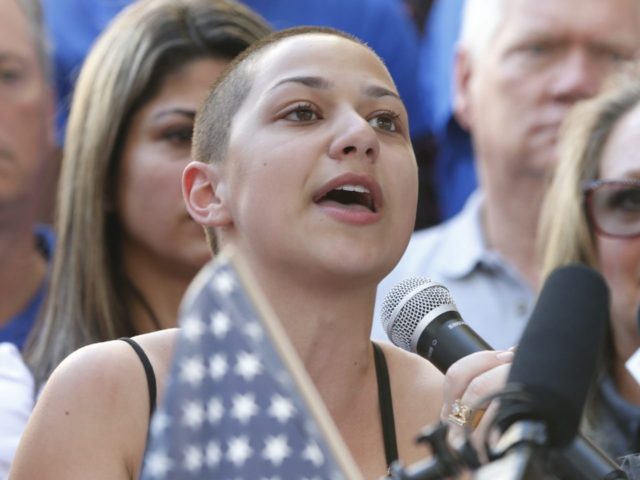The newest iteration of the gun control debate concerns whether teenage survivors of last week’s shooting at the Marjory Stoneman Douglas High School in Parkland, Florida, should be immune from criticism when they argue for gun control.
This is a relatively new question: other school shootings, like Sandy Hook in 2012, have involved children too young to have opinions.
But the answer is no: once you enter the political arena, your views are fair game.
Democrats have perfected the art of using sympathetic public figures to argue for positions most Americans reject, then accusing critics of mean-spiritedness when they disagree.
We saw that tactic in the Khizr Khan controversy in 2016, when a Muslim father whose son died fighting for the U.S. blasted Donald Trump from the podium at the Democratic National Convention. When Trump responded, he was accused of attacking a Gold Star family.
Likewise in the gun control debate, where people who disagree with impassioned calls for gun control from some of the students who survived the Parkland shooting are being accused of attacking children.
Some of the responses to the students are, indeed over-the-top, such as conspiracy theories about whether some of them are trained actors. It is probably true that some are being coached or fed talking points, but that does not make their beliefs less sincere.
However, the fact remains that many of the arguments used by the teenagers are weak, or simply false.
Take Emma Gonzalez, whose gun control speech last week was highlighted by CNN. It is simply not true that it is “harder to make plans with friends on weekends than to buy an automatic or semi-automatic weapon,” as she claims. Gonzalez also blamed the couple that the suspect was living with for not taking away his guns “when they knew he expressed homicidal tendencies.” But they have said that they never saw the warning signs that others who knew him saw.
Or take one of the students who participated in the extraordinary White House listening session on Wednesday, who tearfully cited a false story that has been circulating on the Internet, thanks in part to Chris Cuomo of “#factsfirst” CNN. The story claims that it is possible to purchase an AR-15 rifle in five minutes. It was easily debunked, yet to the distraught student, it seemed very real. His feelings are completely right, but his facts were completely wrong.
The students’ admirable passion does not make their views more credible. Students tend to know less, not more, than other people on most issues, due to their youth and inexperience. They are also more susceptible to being manipulated by adults with agendas.
That does not mean they should be ignored, either, but it is appropriate to ask whether their highly politicized views are really the necessary consequence of their experience as survivors.
The reason that question is legitimate is that there are students whose views are entirely different from those being highlighted by CNN. Buried two-thirds of the way down an Associated Press article titled, “Survivors of deadly school shooting lash out at Trump,” a student named James Ciaramello says: “I mean, tighter gun control, it’s not gonna help. There’s always a way around it.” Needless to say, he is not being featured and fêted by cable news.
Some other survivors of mass shootings also oppose gun control. They include Colorado House Minority Leader Patrick Neville (R), who survived the iconic Columbine shooting two decades ago. They also include U.S. House Majority Whip Steve Scalise (R-LA), who survived lass summer’s mass shooting at a Republican baseball practice.
Those who survive such events are just as divided as the rest of Americans on the issue of gun control. The idea that even sincere critics of the teenage gun control advocates are “attacking” the “kids” is not only offensive, but corrosive to democratic debate. We do a disservice to the children who survive such horrors by telling them that Americans who disagree with them are their enemies. We cannot protect them by protecting them from the truth.
A final observation: the White House listening session showed the wide range of views on this most difficult of topics. After years of being lectured about gun control by President Barack Obama every time a mass shooting happened, it was striking, and refreshing, to watch President Trump listen.
And it was inspiring to watch students, teachers, and parents listen respectfully to each other. It was a model of civility to which we should all aspire.
Joel B. Pollak is Senior Editor-at-Large at Breitbart News. He was named to Forward’s 50 “most influential” Jews in 2017. He is the co-author of How Trump Won: The Inside Story of a Revolution, is available from Regnery. Follow him on Twitter at @joelpollak.

COMMENTS
Please let us know if you're having issues with commenting.